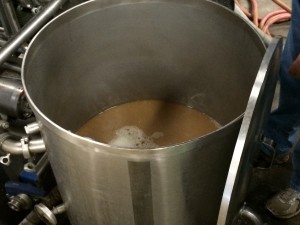Jen wanted a recap of my brew day (March 21, 2015) at NoDa Brewery in Charlotte, so here we go. NoDa is a good small brewery, expanding and working hard to improve QA. It did not take long to appreciate that taking part, or really just being present and able to ask questions, is a big step above a simple brewery tour. The process was to brew a standard batch of one of their beers through the mash, boil and chiller and then to dish out 5 gallons to each of the club members participating. The members can add sugar or malt, yeast and additional hops, especially dry hops. The standard NoDa beer used for this event was Ramble-On-Red.
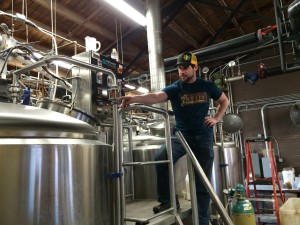 Chad, NoDa’s head brewer and
Chad, NoDa’s head brewer and
Todd, the owner, hosted the event
Above, Chad begins the mash which runs for over an hour, starting about 154º and continuing with the loss of only a degree or two. Late in the process, wort is recirculated through a collection vessel (below), fed by gravity but pumped back into the mash to be filtered through the grain bed. Because of the inclusion of 12% rye in the grain bill they add rice hulls to help keep the grain bed loose and avoid a stuck mash.
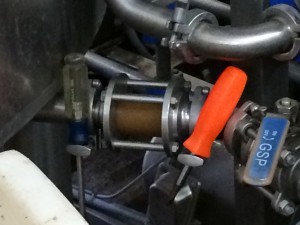
Visible through a sight glass, wort is initially
cloudy as it starts recirculation..
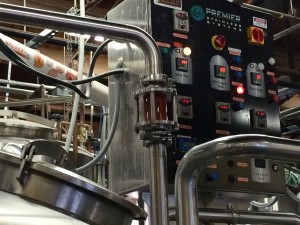 …but clears as the process progresses
…but clears as the process progresses
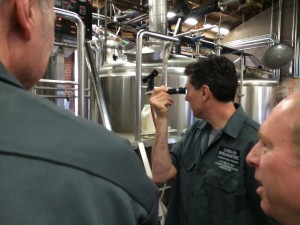 Club member checking refractometer. Wort is about 1.085 gravity
Club member checking refractometer. Wort is about 1.085 gravity
as it starts the sparge and starts the boil about 1.052
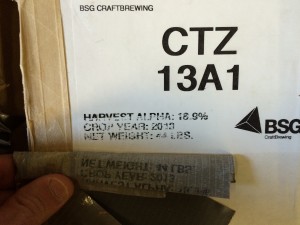 Meanwhile, club members have been measuring
Meanwhile, club members have been measuring
out hops in anticipation of the boil.
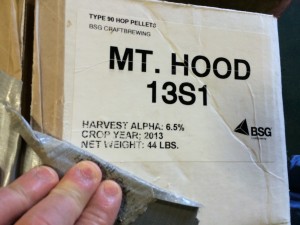
The wort is sparged and pumped from the
mash tun (left) to the kettle (right).
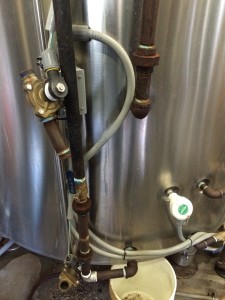 Behind the kettle, valves control the flow of
Behind the kettle, valves control the flow of
steam piped from a boiler in the back into the steam jacket
As the wort comes to a boil, the first bittering
hops are ready to add to the kettle by a club member
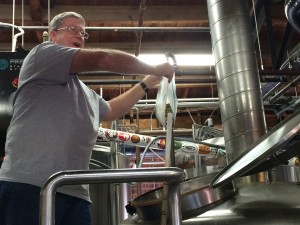
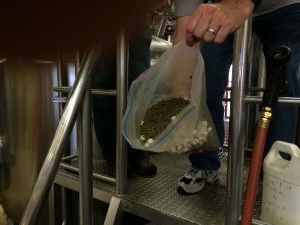 A late addition includes whirlfloc tablets
A late addition includes whirlfloc tablets
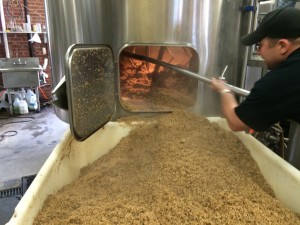 Meanwhile, a club member helps
Meanwhile, a club member helps
clean the mash tun
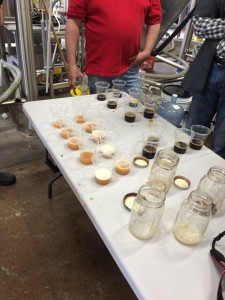 Nearby, the QA guy had samples from two batches about ready to leave the fermentor. Two samples are taken from each beer, one of which is heated to 150º and both are tasted for traces of dyacital (the heat accelerates the conversion of precursors to dyacital). None of us noted any traces so they were ready to be chilled and moved to the bright beer tank.
Nearby, the QA guy had samples from two batches about ready to leave the fermentor. Two samples are taken from each beer, one of which is heated to 150º and both are tasted for traces of dyacital (the heat accelerates the conversion of precursors to dyacital). None of us noted any traces so they were ready to be chilled and moved to the bright beer tank.
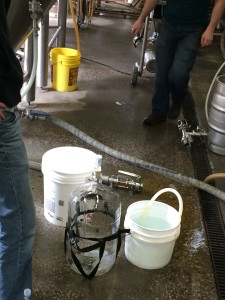 As the boil finished and the chiller prepared, we
As the boil finished and the chiller prepared, we
lined up for our 5 gallon allotments
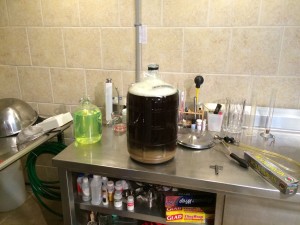 Fortunately I did not drop the carboy as I crossed North Davidson
Fortunately I did not drop the carboy as I crossed North Davidson
and was able to wedge it on the back seat floor of the Acura,
bringing it safely back to my brewery.
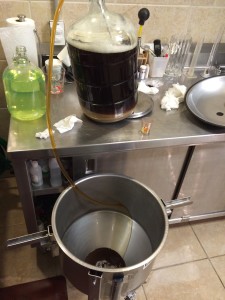 It was then syphoned into a conical after carefully
It was then syphoned into a conical after carefully
cleaning my mouth with some Talisker, preserving
an important tradition.
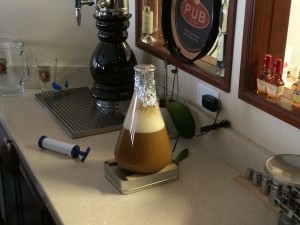 Yeast was added from a starter prepared the
Yeast was added from a starter prepared the
prior day using a vial of WLP001…
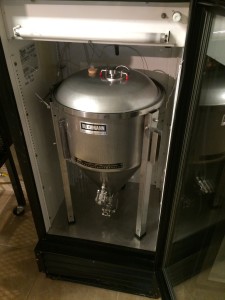 …and fermentation begins
…and fermentation begins
Some brewing and batch details for the nerds:
Because we leave for our month-long trip on April 1, this needs to ferment-out quickly and be chilled-down prior to that time. The wort as provided had been oxygenated but I added more at 0.5 l/minute for 2 minutes. Because I aim to minimize final gravity (reduce carbs) enzymes were added at pitching and a second starter of champaign yeast will be added on day 2.
My starter (split for two yeast additions) was different than normal. I did just under a gallon of what was essentially a dry malt extract beer with gravity of about 1.047 and an IBU of 62. Hop adds included Amarillo at the start and again at 5 minutes, home grown Cascades at 10 minutes and store-bought Cascades at 5 minutes. The initial Amarillo was a first-wort addition prior to the start of the 30 minute boil. All hop additions listed above were 0.25 once. One once of Citra leaf will be used for dry hopping.
So the intent is to thin the beer only minimally to a combined starting gravity in the low to mid 1.050s while increasing the bitterness from 30 IBU in the base wort to something more like 35. With the efforts to maximize attenuation and the extra hops I am hoping for a pale ale-like red rye ale that is easy to drink but with a bit of hop character.
And I can’t help it, I just love that sound: Life
